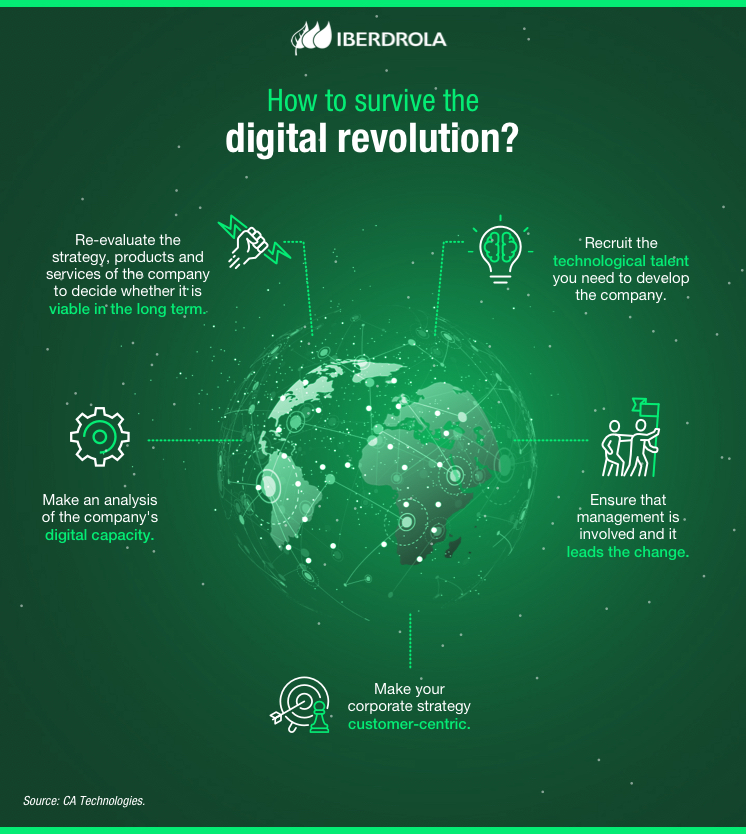WHAT IS DIGITAL DARWINISM?
Digital darwinism or how to survive the technological revolution
According to the first list published by Fortune magazine in 1955, 429 of the 500 most important companies in the world no longer exist. In a volatile society like ours, where the digital revolution is changing the way we consume, communicate and get information, companies — like species — must adapt to survive.

WHAT IS DIGITAL DARWINISM?
The Fourth Industrial Revolution is already here. And like any revolution, it brings with it profound change. New technologies will be the cornerstones of this transformation and will impact production models, manpower, relationships with consumers, etc. Artificial Intelligence (AI), machine learning, big data, 3D and 4D printers, 5G, Virtual Reality, blockchain, Augmented Reality and the Internet of Things (IoT) are among the technologies that will mark our present and our future.
To survive the Fourth Industrial Revolution we need to adapt to this new situation: faster, more volatile, less controllable. In this context some are speaking of digital darwinism. This concept, an up-to-date version Charles Darwin's theory that "it is not the strongest species that survives, nor the most intelligent. It is the one that is most adaptable to change", refers to the need for businesses and people to adapt to new situations arising due to digitalisation. And our survival is still at stake because those who fail to adapt get left behind.
The term was made popular by writer and marketing expert Tom Goodwin, who said that the digital revolution is not only about adopting new technologies, but breaking away from the processes and strategies of the past. "The digital transformation depends 99% on people and culture", insists Goodwin. In other words, the digital transformation of companies lies in rethinking needs and using new technologies to adopt solutions.
THE DIGITAL TRANSFORMATION AND THE CHANGE OF MENTALITY
"In 1960, the average lifespan of companies was 60 years, and in 2020 it will be 20." This statement by Marco Comastri, EMEA president at CA Technologies, is the perfect expression of the extent to which swift adaptation to change is vital to obtain a competitive advantage and to survive. "The digital world is speeding up and companies have two scenarios: one is to behave as though nothing is happening and the other is to seize the new opportunity."
Surviving in the new scenario necessarily means digital transformation of the company, in other words, adopting the technology necessary to cope with the changing behaviour of customers. But mere investment in technology is not enough. According to Aaron Levie, CEO and founder of cloud storage company BOX, "adding software to an obsolete process does not digitalise a company."
Innovation entails more than buying the best technology. It also requires upgrading processes to develop new ways of interacting with technology to obtain the best performance possible. At the same time, it is essential to transform human resources in organisations to be able to harness the possibilities offered by new technologies. It might appear that innovation is exclusively of start-ups, but this is not so... innovation and adaptation to change are part of the DNA of all companies and their members.

THE KEYS TO ADAPT TO THE DIGITAL REVOLUTION
The digital revolution has imposed new business models, new payment methods, new ways of buying, finding information, communicating and relating in which there is no place for the Shakespearean dilemma "to be or not to be" — on a digital level — if we want to survive. A look back over recent years should suffice to show how big companies that did not keep up with the times are no longer with us. To avoid following in their footsteps many others have accepted the importance of evolving in digital terms.
This aside, no digital conversion will be a success without adopting a user-centric business strategy and, to achieve this, you must know about it. How? By analysing the information generated. If adequately processed, the thousands of gigabytes of data generated every day will be worth their weight in gold. And although many companies may believe that big data is only available to big companies, any enterprise, large or small, can access data mining if they invest in suitable profiles and tools.
Consumers have changed, too, and they are more demanding than ever. Now they are permanently connected, which means they have more information and they want their demands to be satisfied more quickly. They no longer want just the best product at the most competitive price. They want unbeatable service and personal attention to give them a positive experience. In other words, the key is to offer the customer an excellent experience. Thus, the companies that best adapt to the new situation are those which manage to satisfy their customers' needs simply, intuitively and correctly.




